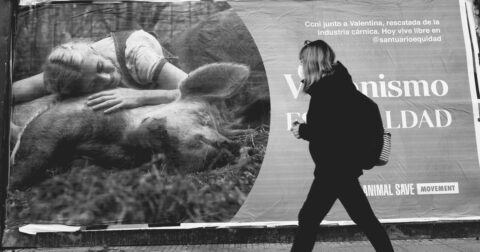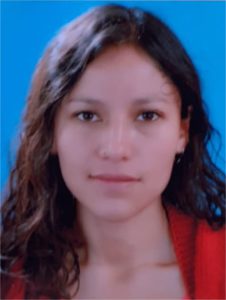Analysis
The Loss of Chevron Could Also Be a Major Loss for Animals
Law & Policy•6 min read
Reported
“I found people with beautiful hearts who give everything for animal advocacy,” says Hillary Cabrera Gavilán, who first got involved when she was 19.


Words by Matilde Nuñez del Prado Alanes
Members of Gen Z are creating their own organizations to promote animal rights and other social justice issues that hit close to home for young people around the world. One of these organizations is DifusionV, a decentralized activist network with more than 90 active groups around the world.
The activists consider themselves part of the movement for animal, human, and earth liberation. They work to encourage critical thinking about animal agriculture and other exploitative industries through protests and other forms of direct action. In Latin America, the organization has members in nine countries, including Argentina, Bolivia, Chile, Colombia, Paraguay, Uruguay, Mexico, Guatemala and Peru. They range in age from 17 to 30.
Sentient Media spoke with Hillary Cabrera Gavilán, now 25, who is one of the organizers for DifusionV. She is based in Ica, Peru, and has been involved in the animal protection movement since she was 19. She is currently a law student at the San Luis Gonzaga National University.
This interview is translated from Spanish.
Matilde Nuñez del Prado: DifusionV is committed to animal rights and social justice. As a representative of the organization in Peru, what are your activities? How do you personally commit to these causes and the goals you want to achieve?
Hillary Cabrera Gavilán: I have been an activist for the rights of non-human animals for 6 years. I am vegan and study Law. I wish I could achieve many goals that I have in mind regarding animal rights here in my city and, why not, in my country. In addition to Law, I really like everything that has to do with art, especially music, so I would also like to do artivism to achieve a greater reach.
Matilde: Practicing veganism is a personal way of commitment and action in favor of animal rights, but not everyone does it. What motivated you to stop consuming animal products?
Hillary: I became vegan by myself. But, the one who made me think deeply was my rescued dog Flicka. On December 5, we had to make the difficult decision to euthanize her since she was in very bad shape. Seeing her suffer and die taught me that if I felt pain for her, why couldn’t I see other species the same way? Adding to that, I saw a video that showed all the cruelties of the animal slave industries. That’s how I decided not to be part of that chain anymore and to be vegan.
Matilde: Those who decide to venture into veganism usually have some difficulties, both personal and for close people around them. This is even more complex among young people who still live with their parents. You were 19 years old when you took the step, was it very difficult for you to practice veganism at first? How did your family take it?
Hillary: To be honest, I ate a lot of animal products before, but I was very convinced that I wanted to be vegan, so I was firm about it.
My mother was worried at first because a relative told her that was going to make me sick. She asked me to “at least” eat eggs or yogurt, which I refused. In the beginning, I felt a bit weak when I exercised, but it was because I hadn’t informed myself and I didn’t balance my diet well. So I read about food substitutions and started a healthier transition. After a while, I felt even better than before I was vegan.
Sometimes I felt frustrated by what I heard coming out from people around me because of my position: teasing, bullying, and other negative attitudes. And it was more painful when it came from my family. But meeting more people of my generation with the same purpose during activism helped me a lot to strengthen my veganism. Now, my mother turned vegan too, and that also helps me a lot.
Matilde: How has your life changed by being vegan?
Hillary: My life, as a vegan, changed for the better. I really feel like I found myself in many ways. I began to have a voice, and not remain silent in the face of injustice. I also found my empathic side. I found the beauty in respecting even the smallest beings, even if it’s a cockroach.
I also have to admit that as I became more sensitive, I also became too irreverent. And this is a part that I try to eradicate. I want there to be a balance in me.
Socially, within the movement, I found people with beautiful hearts who give everything for animal advocacy. My activist friends, whom I greatly admire, are my second family to me. And when someone wants to throw in the towel, because of so much inhumanity that sometimes surrounds us, I try to remind them that every fight started like this: with ridicule, calling you crazy, sick, extremist, even a terrorist. But, in the end, history is on our side and we must continue until we obtain animal liberation. It is very important to break with old customs, traditions, and patterns.
Matilde: You told me you study law. Does having chosen that career has anything to do with your animal advocacy?
Hillary: My interest in studying law was because injustice has always bothered me. Since I became a vegan, and at the same time an activist, I hope to be able to help in cases of animal abuse when I get my degree. If possible, I would like to open a law firm that focuses on animal law.
Matilde: DifusionV was born in Argentina and now it’s stablished in several Latin American countries. Could you tell me how DifusionV arrived and spread in Peru? What are your objectives and what activities do you carry out?
Hillary: DifusiónV is a non-profit organization. It is responsible for spreading the message of animal liberation through posters and stickers with clear and concise messages. Searching in this way that those who receive the message come to question their relationship with non-human animals.
In Peru, DifusionV has been expanding during the pandemic. There were more broadcast facilities. People paid more attention to what was around them. There are currently volunteers in eight cities: Lima, Chiclayo, Huancayo, Chincha, Callao, Lima Norte, San Martín de Porres and Ica. Soon we will start making calls for more people to join us and to reach more cities.
The main activity is to put posters and stickers in crowded places. In Ica we also give informative talks, we carry out mobilizations and soon we will do murals.
Matilde: Which activity do you think has the greatest impact?
Hillary: I feel that the posters and stickers have given good results in a broader scope. The information is about animal liberation. We use direct messages like “We are the species in danger of extinct everything.” During the pandemic, when you couldn’t go out or talk to people physically, many wrote to us on social networks after seeing one of our messages on the walls and joined us. Sometimes, some non-vegan people upload images of our messages to their social networks saying that it is true. I feel like people make a connection with the stickers… they feel curiosity.
Matilde: DifusionV works in conjunction with the organization voicot.com. How does this association work and what is the role of voicot.com in the activities DifusionV carries out?
Hillary: The relationship that DifusionV and voicot.com have is that they work together to carry the message for animal liberation. On voicot.com there are people who work as photographers, advertisers, and writers. They prepare the stickers and DifusionV spreads them. In this way, the streets are intervened with anti-species messages.
Matilde: Most members of DifusionV in Ica are young and all the work they do is voluntary. However, it is clear that financial resources are needed for the diffusion materials. How do you get financing?
Hillary: The stickers are sent from Argentina to Lima and from there they are sent to the different active DifusionV groups throughout the country. Some other stickers and materials are financed by us with our own resources. Sometimes we organize vegan hamburgers sales to help animals that need assistance and we have the leftovers saved for things we need for protests or other activities.
Matilde: Intuitively, it can be perceived that anti-speciesist awareness has a great impact on Gen Z. What do you think of your generation in relation to this issue? Do you think that veganism is growing among younger people or is it something that transcends generations?
Hillary: About my generation, I think there is a certain change, but I would like them to be more active. I feel that many don’t take the step for fear of being rejected by society or because of a lack of support from their relatives. But precisely as young people we cannot be indifferent to injustice. Little by little, we can achieve changes, but it is not just about expressing an opinion on networks, we also need to take action. Let’s not forget the system wants to keep us distracted. So, as a young generation, we must be more active. And what better than practicing veganism, which would provide that balance that the world needs.
On the other hand, I see that veganism is growing among young people. It is expanding in many countries. These small changes should be celebrated. As activists, that helps us to motivate ourselves more. Everything is in how much determination we have and that our convictions are clear. Change is in our hands, the life of non-human animals is in our hands.
Matilde: Being a zoomer yourself, how do you think it is possible to develop a greater interest in animal rights in the young people of your generation?
Hillary: I think by listening to them and providing them information without making them feel judged. By dialoguing, they can realize the need to break with patterns, traditions, or customs that bring negative consequences for society and involve victims. It’s important to show them that because something has been repeated from generation to generation it doesn’t mean it cannot be changed. The information cannot be hidden, much less made up. They need to feel confident to defend their convictions. The key is persistence. Sooner or later people are going to adapt to needed changes for society to thrive, and we young people can set an example.